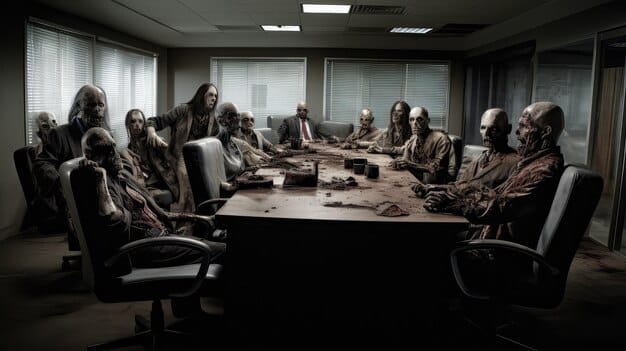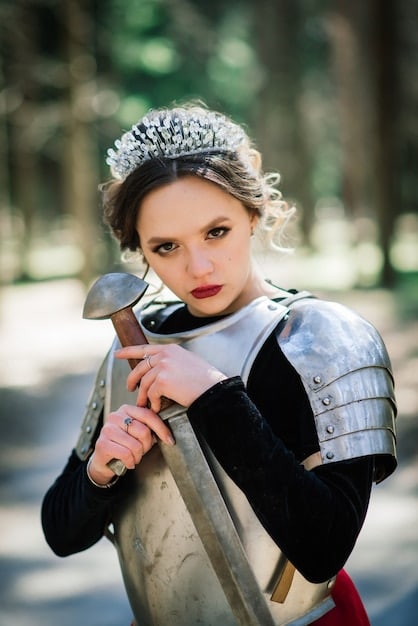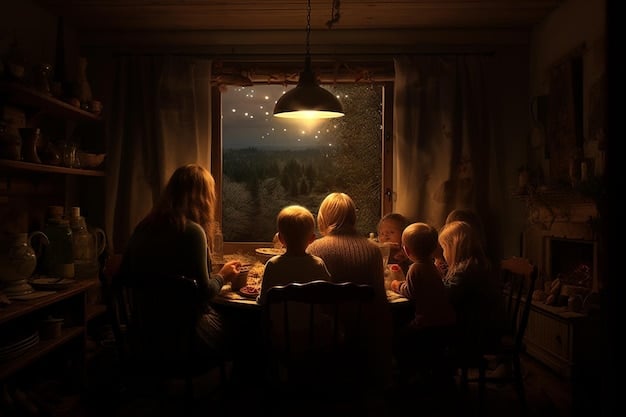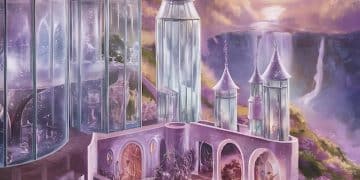Netflix’s The Witcher: Political Intrigue and Power Struggles Explored

Netflix’s ‘The Witcher’ intricately portrays the Northern Kingdoms, rife with political maneuvering and intense power struggles, mirroring the complex relationships and betrayals that define its narrative.
The Northern Kingdoms of Netflix’s ‘The Witcher’ are not merely a backdrop but a volatile chessboard where kings and sorceresses, knights and spies, play a deadly game for supremacy. The Continent’s fate hangs in the balance, making every alliance and betrayal crucial.
Understanding the Political Landscape of The Witcher
The world of ‘The Witcher’ is steeped in complex political dynamics. Understanding these power structures is key to appreciating the depth of the narrative, revealing how characters navigate treacherous alliances and deadly rivalries.
The Significance of Kingdoms in The Witcher Universe
Each kingdom in ‘The Witcher’ has its own distinct identity, history, and interests, contributing to a fragmented political landscape. This fragmentation often leads to conflicts and uneasy alliances.
Key Players and Their Ambitions
From King Foltest of Temeria to Queen Calanthe of Cintra, each ruler is driven by personal and national ambitions. Their interactions shape the fate of the Continent.
- Explore the ambitions of King Foltest to maintain order while managing his own personal demons.
- Understand Queen Calanthe’s fierce determination to protect Cintra, even at a great cost.
- Analyze the motivations of various rulers and their impact on the political climate.

In conclusion, grasping the political landscape of ‘The Witcher’ involves acknowledging the distinct identities, histories, and key players of the Northern Kingdoms. The ambitions that drive each figure sculpt the world and set the stage for intricate conflicts and alliances.
Nilfgaard’s Expansion and the Northern Kingdoms’ Response
The looming threat of the Nilfgaardian Empire casts a dark shadow over the Northern Kingdoms, forcing them into strategic alliances and desperate measures. This external menace shapes the domestic policies and international relations of each kingdom.
The Threat of Nilfgaard
Nilfgaard’s relentless expansion poses an existential threat to the Northern Kingdoms, disrupting the balance of power and forcing them to unite, or be conquered.
Alliances and Betrayals
In the face of Nilfgaard, alliances are forged and broken as kingdoms grapple with their survival. These relationships are often tested by personal ambitions and conflicting interests.
- Identify the primary motivations behind alliances and betrayals among the Northern Kingdoms.
- Examine specific instances where alliances shifted due to strategic necessity or personal vendettas.
- Discuss how the looming threat of Nilfgaard influenced the decision-making processes of key rulers.
Nilfgaard’s expansionist agenda forces the Northern Kingdoms into alliances, a response fraught with internal tensions and betrayals. The kingdoms’ survival hinges on their ability to navigate this complex web of power and rivalry.
The Role of Magic and Mages in Political Affairs
Magic and mages are integral to the political fabric of the Northern Kingdoms, serving as advisors, strategists, and powerful weapons. Their influence extends into every aspect of governance and warfare.
The Influence of the Brotherhood of Sorcerers
The Brotherhood of Sorcerers wields significant influence, advising kings and shaping political outcomes. Their expertise in magic makes them indispensable.
Individual Mages and Their Loyalties
Individual mages such as Yennefer and Triss play pivotal roles, often torn between their personal loyalties and political obligations. Their choices have far-reaching consequences.

- Analyze how mages like Yennefer navigate their roles as political advisors while maintaining their own agendas.
- Discuss the moral dilemmas faced by mages who must balance their magic and their allegiances.
- Explain how the presence of mages alters the power dynamics between kingdoms.
Magic and mages are intrinsic to the political dynamics of ‘The Witcher’, providing strategic advantages and influencing critical decisions. The allegiances and moral conflicts of individual mages shape the overarching narrative and power balance in the Northern Kingdoms.
Economic Interests and Trade Routes
Economic interests and trade routes are essential drivers of the political tensions in the Northern Kingdoms. Control over resources and trade lanes often leads to conflicts and strategic maneuvering among the kingdoms.
Control of Key Resources
The struggle to control essential resources like grain, ore, and magical components fuels many conflicts. Kingdoms vie for dominance over these assets to strengthen their positions.
Trade Agreements and Disputes
Trade agreements can either foster cooperation or incite disputes, depending on the terms and the parties involved. These economic pacts are crucial for the prosperity of each kingdom.
Economic interests and trade routes serve as critical elements in the political landscape of the Northern Kingdoms. Control over resources and trade agreements significantly affect the relationships and strategic decisions of each entity.
The Impact of Monsters and Supernatural Threats
The presence of monsters and supernatural threats affects the political stability of the Northern Kingdoms, often diverting resources and creating widespread fear. These challenges necessitate cooperation and specialized expertise.
The Witcher’s Role in Maintaining Order
Witchers like Geralt are essential for maintaining order by hunting monsters that threaten human settlements. Their work often brings them into contact with political figures and intrigue.
The Political Implications of Monster Attacks
Monster attacks can destabilize regions, forcing kingdoms to allocate resources and seek alliances. These events frequently expose political vulnerabilities and weaknesses.
- Explain how monster attacks can be exploited for political gain or used to undermine rival kingdoms.
- Describe the various approaches that different kingdoms take to manage monster threats, and the effectiveness of these strategies.
- Discuss the long-term effects of frequent monster attacks on the socio-political landscape of the Northern Kingdoms.
Monsters and supernatural threats significantly impact the political equilibrium of the Northern Kingdoms. The presence of Witchers like Geralt and the political ramifications of monster attacks create a world where survival and governance are intertwined, fostering opportunities for both cooperation and exploitation.
The Prophecies and Their Influence on Political Decisions
Prophecies, particularly the prophecy of Ithlinne, loom large over the Northern Kingdoms, influencing political decisions and shaping the fates of individuals and nations. These prophecies are often interpreted and manipulated for political advantage.
The Prophecy of Ithlinne
The prophecy of Ithlinne, foretelling an ice age and the end of the world, causes widespread fear and uncertainty, driving many leaders to make desperate choices.
Political Manipulation of Prophecies
Political figures frequently use prophecies to justify their actions, rally support, or undermine their rivals. The ambiguity of prophecies allows them to be twisted for personal gain.
- Analyze how different characters interpret and react to the prophecies, and their underlying motivations.
- Discuss specific instances where prophecies were used to manipulate political outcomes.
- Explain the degree to which prophecies shape the overall narrative and the decisions of the characters.
Prophecies wield significant influence in the political arena of ‘The Witcher’, guiding actions and shaping destinies. The manipulation and diverse interpretations of these prophecies by political figures illustrate the complexities and uncertainties that define the governance dynamics of the Northern Kingdoms.
| Key Aspect | Brief Description |
|---|---|
| 👑 Kingdom Ambitions | Rulers like Foltest and Calanthe strive to protect and expand their realms. |
| ⚔️ Nilfgaard’s Threat | The invading empire forces alliances and betrayals among Northern kingdoms. |
| 🔮 Magic Influence | Mages like Yennefer shape political decisions and serve as advisors. |
| 👹 Supernatural Threats | Monsters destabilize regions, requiring witchers and straining kingdom resources. |
FAQ
▼
The Northern Kingdoms consist of various independent factions, each led by kings, queens, and powerful mages, striving for dominance or survival amid constant threats and shifting alliances.
▼
Nilfgaard’s aggressive expansion threatens the Northern Kingdoms, forcing them into tenuous alliances and stirring up internal conflicts as they try to defend against invasion.
▼
Mages wield substantial political power by serving as advisors, strategists, and influencers, often shaping the decisions of rulers and dictating the course of nations with their magical abilities.
▼
Key prophecies, such as the prophecy of Ithlinne, play crucial ideological roles by influencing decision-making, stirring fears, and justifying actions of various political leaders across the kingdoms.
▼
Monsters disrupt political stability by causing resource diversion, fear, and widespread destruction, compelling kingdoms to seek protection from witchers and potentially altering political alliances.
Conclusion
Exploring the political intrigue and power struggles in Netflix’s ‘The Witcher’ reveals a world where survival depends on navigating treachery, managing alliances, and understanding the interplay of magic, economy, and prophecy. The Northern Kingdoms provide a rich backdrop for a narrative where every decision is fraught with consequence.





